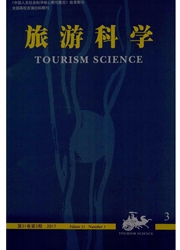

 中文摘要:
中文摘要:
内部服务质量是酒店业保持长期竞争优势的核心竞争力,但尚未得到企业界与学术界的足够关注。本文以厦门市5家五星级酒店的一线员工和管理人员为调查对象,探讨内部服务质量对不同代际员工的服务导向与服务质量的影响。研究结果表明,内部服务质量包括流程型和后台型两个方面;员工服务导向是联系两个方面内部服务质量与外部服务质量的重要中介变量,会部分中介流程型内部服务质量对外部服务质量的影响,完全中介后台型内部服务质量对外部服务质量的影响。与年长员工相比,年轻员工感知的后台型内部服务质量和服务导向意识均较低,而且更可能在工作中表现出斤斤计较的“回报谨慎”个性特征。此外,员工的回报谨慎和代际年龄均对流程型内部服务质量与服务导向的关系起到调节作用,即对于年轻或高回报谨慎型员工,流程型内部服务质量对他们服务导向的影响更强。
 英文摘要:
英文摘要:
Internal service quality (ISQ), one of the core competitiveness of hospitality industry to maintain its long-term competitive advantages, hash' t attracted enough attentions of both the industry circle and academic circle. Using a sample of front-line employees and managers of five five-star hotels in Xiamen as a case in point, this study explored the effects of ISQ on different generational staffs' service orientation and service quality. The results indicate that ISQ consists of workflow and department support. As an important mediator between the two aspects of ISQ and external service quality, service orientation partly mediates the relationship between workflow-ISQ and external service quality, and fully mediates the relationship between department support-ISQ and external service quality. Moreover, reciprocation wariness and different generational age moderate the relationship between workflow-ISQ and service orientation. That is to say, staffs perceived ISQ has a much stronger effect on their service orientation for younger employees of high reciprocation wariness.
 同期刊论文项目
同期刊论文项目
 同项目期刊论文
同项目期刊论文
 How and When the Effect of Ethical Leadership Occurs? A Multilevel Analysis in the Chinese Hospitali
How and When the Effect of Ethical Leadership Occurs? A Multilevel Analysis in the Chinese Hospitali 期刊信息
期刊信息
